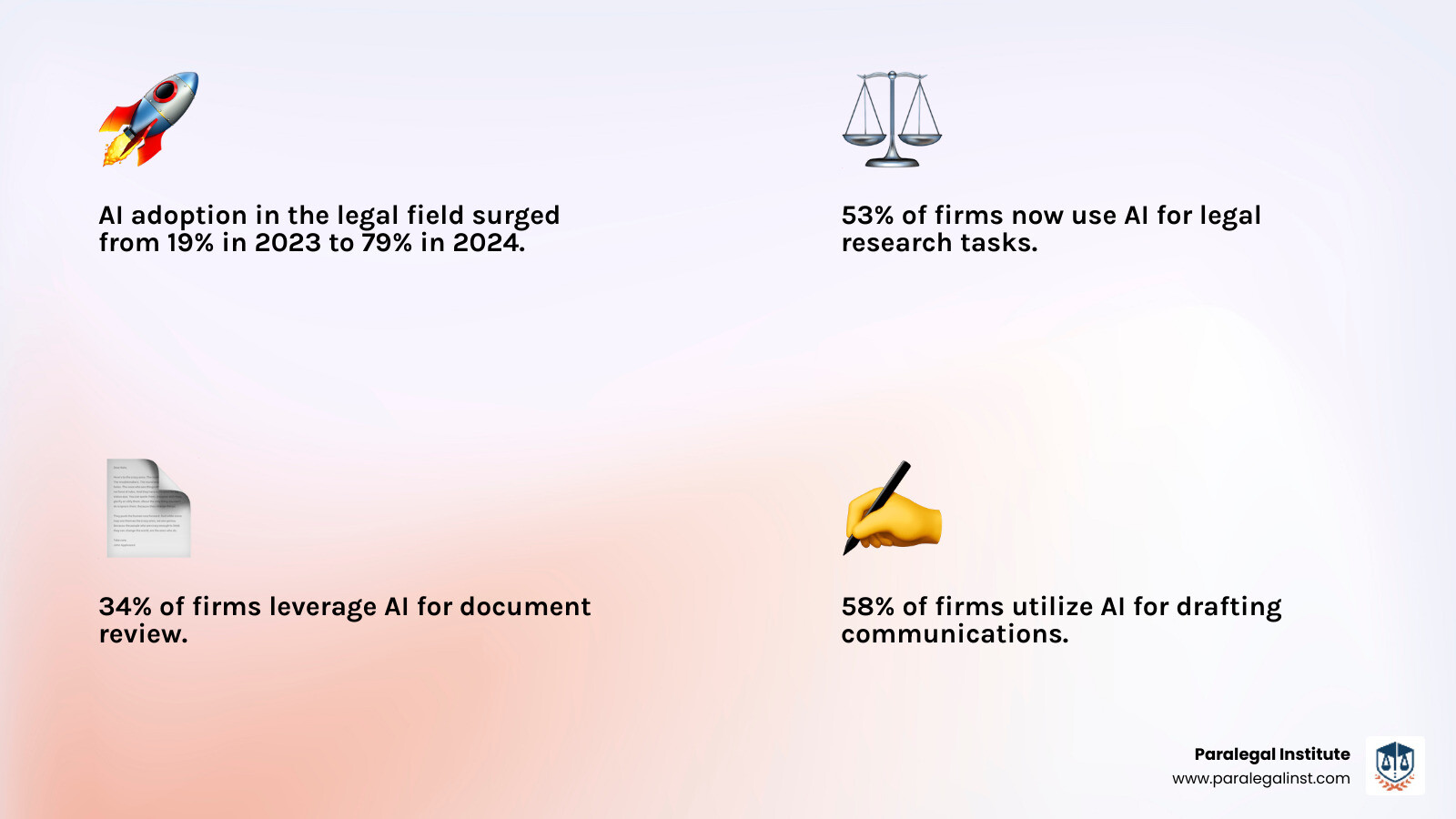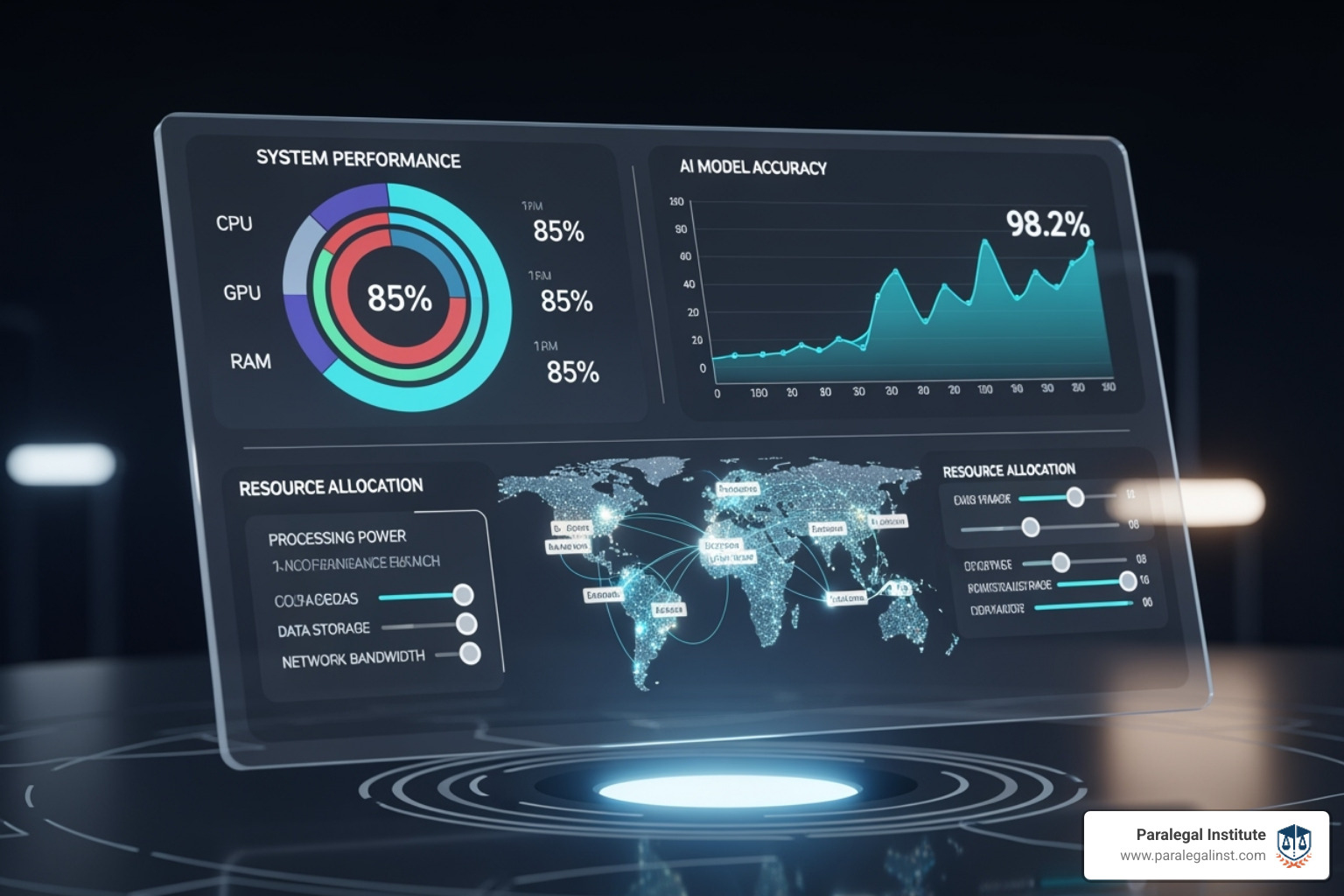From Paperwork to Power Moves: AI Tools Every Paralegal Needs
The body content of your post goes here. To edit this text, click on it and delete this default text and start typing your own or paste your own from a different source.
The AI Revolution in the Paralegal Profession
AI tools for paralegals are changing the legal profession at breakneck speed. According to Clio's Legal Trends Report, AI adoption in the legal field has surged from just 19% in 2023 to an impressive 79% this year - a 60% jump that shows how quickly the industry is embracing this technology.
Top AI Tools Every Paralegal Should Know:
- Legal Research: CoCounsel, Lexis+ AI, and Harvey AI for case law analysis
- Document Review: Diligen for contract analysis and clause identification
- General Tasks: ChatGPT, Claude AI, and Copilot for drafting and communication
- Case Management: Gavel.io and Smith.ai for client intake and virtual assistance
- Specialized Tools: Legal Robot for document analysis and Supio for personal injury cases
The numbers tell the story: 53% of firms now use AI for legal research, while 34% leverage it for document review. These tools aren't replacing paralegals - they're making them more powerful and valuable.
Think of AI as your digital assistant that never sleeps. It can draft documents, analyze contracts, summarize depositions, and research case law in seconds. This frees you up for the strategic, high-value work that only humans can do.
As someone who has owned and operated a medium-sized law firm and hired numerous paralegals, I've seen how AI tools for paralegals can transform both individual careers and entire legal teams. I'm Matthew Pfau, and through my experience training paralegals at UNLV and developing curriculum at Paralegal Institute, I've watched AI evolve from a nice-to-have into an essential skill set.

The Paralegal's AI Toolkit: A Guide to AI Tools for Paralegals

The legal world is changing fast, and as paralegals, we're right at the center of it all. We're no longer just managing files and scheduling meetings - we're becoming strategic partners who help law firms run smarter and more efficiently. AI tools for paralegals are making this change possible, giving us superpowers we never had before.
With dozens of AI tools appearing monthly, how do you know which are worth your time? Let's break it down.
What to Look for in AI tools for paralegals
Not all AI tools are created equal, especially when you're dealing with sensitive legal work. Choosing an AI tool is like hiring a team member: you need one that understands the job, maintains confidentiality, integrates well, and is easy to use.
Legal-specific training should be your first priority. General AI tools are impressive, but legal work is different. You need tools trained on legal documents, case law, and court procedures, so they speak our language.
Security protocols aren't just important - they're absolutely critical. When handling confidential client information, you need tools that prioritize data privacy. Look for tools that mention SOC 2 compliance, encryption standards, and closed models that don't use your data to train other systems. Your clients trust you with their secrets, and that trust is priceless.
Integration capabilities can make or break your workflow. The best AI tools for paralegals don't force you to learn entirely new systems. Instead, they work with what you already use - your case management software, document systems, and email platforms.
User-friendliness might seem obvious, but many powerful tools are surprisingly difficult to use. If you need a computer science degree to generate a simple document summary, that tool isn't helping anyone.
General AI Assistants for Everyday Tasks
Sometimes you don't need a specialized legal tool - you just need help with the everyday stuff that eats up your time. That's where general AI assistants like ChatGPT, Gemini, and Copilot become your best friends.
These tools excel at drafting emails when you need to send that perfect follow-up message or explain something complex to a client. They're also fantastic for summarizing notes from long meetings or depositions - just feed them your notes, and they'll give you the highlights in seconds.
Need help brainstorming different ways to organize a brief or present information? These AI assistants can offer fresh perspectives when you're stuck in a mental rut.
ChatGPT is great for general writing and editing tasks, while Gemini can work with different types of content including audio and video. Copilot integrates directly with Microsoft Office, so you can get AI help right inside Word, Excel, and Outlook.
Here's an important heads-up though: these general tools have different knowledge cutoff dates , meaning they might not know about recent legal developments. And please, never share confidential client information with these general tools - save that for the specialized legal platforms.
Specialized AI for Legal Research and Analysis
Now we're getting to the really exciting stuff. AI tools for paralegals designed specifically for legal research are changing the game completely. The days of spending hours on case law research, only to worry you missed something important, are ending.
Tools like Lexis+ AI, CoCounsel, and Harvey AI are built for legal professionals. They offer AI-powered case law search that can analyze thousands of cases in the time it used to take you to read one. These tools understand legal concepts and can perform statute analysis that breaks down complex laws into understandable pieces.
Summarizing legal documents becomes effortless when you can upload a 200-page deposition and get a clear, concise summary in minutes. The AI can also excel at identifying precedents that support your case, finding connections you might have missed.
The best part? You can use natural language queries instead of those complex Boolean searches that always seemed designed to frustrate you. Just ask your question in plain English, and the AI understands what you need.
The numbers don't lie - 53% of firms are now using AI for legal research. These tools act as force multipliers, helping you conduct more thorough research in a fraction of the time. For more detailed guidance on research techniques, check out our Legal Research Guide for Paralegals.
AI-Powered Document Management and Review
Document review used to be where paralegals spent countless hours, but AI tools for paralegals are changing this entire process.
Modern AI can handle discovery tasks at lightning speed, processing thousands of documents and flagging the relevant ones for your attention. Contract analysis becomes manageable when AI can scan agreements and highlight unusual clauses or potential red flags.
Clause identification is particularly impressive - the AI can automatically extract key terms, deadlines, and obligations from contracts, creating organized summaries that would have taken hours to compile manually. Document summarization helps you quickly understand the key points of lengthy agreements or court filings.
Some advanced tools can even help with creating timelines from multiple documents, which is incredibly valuable for understanding the sequence of events in complex cases. Due diligence tasks become more systematic and thorough when AI helps ensure nothing important gets overlooked.
The statistics tell the story: 34% of firms use AI for document review, 23% for contract templating, and 21% for due diligence. These tools can save 85-90% of the time previously spent on document drafting and review processes.
AI for Case and Practice Management
Beyond handling specific legal tasks, AI tools for paralegals are also revolutionizing how we manage entire cases and client relationships. These tools help create smoother workflows and better client experiences.
Automated client intake systems can handle initial client interactions, gathering basic information and qualifying leads before they reach you or the attorneys. This ensures that when you do connect with potential clients, you're already armed with relevant background information.
Deadline tracking becomes smarter with AI-powered systems that can prioritize urgent tasks and send intelligent reminders. Document automation platforms can transform complex legal documents into user-friendly forms that clients can complete online.
Generating reports becomes effortless when AI can analyze case data and create insights about progress, resource allocation, and outcomes. Virtual receptionists powered by AI can handle routine client inquiries, schedule appointments, and even provide basic information about services.
These management tools help handle the increasing complexity of modern legal practice. With 58% of firms using AI for drafting communications and growing numbers adopting AI for various administrative tasks, these tools are becoming essential for staying competitive and providing excellent client service.
How to Effectively and Ethically Use AI in Your Paralegal Work

Embracing AI isn't just about knowing which tools to use; it's about understanding how to integrate them effectively and ethically into our daily practice. This requires a thoughtful approach, balancing efficiency with responsibility.
Integrating AI into Your Daily Workflow
The key to successful AI adoption is a phased approach. Don't try to automate everything at once; start small.
- Start small: Identify one or two repetitive, time-consuming tasks that AI could realistically handle. Perhaps it's drafting initial client emails or summarizing short legal documents.
- Identify repetitive tasks: Audit your daily responsibilities. What tasks do you dread because they're tedious but necessary? These are prime candidates for AI assistance. Automating these tasks frees up our valuable time for more strategic, high-value work.
- Master prompt engineering: AI is only as good as the instructions it receives. Learning how to write clear, concise, and context-rich prompts is crucial for producing helpful results. Think of it as teaching a very smart, but literal, intern. The more context you provide, the better the output. Our Advanced AI for Paralegals course digs into this crucial skill.
- Verify AI output: Always, always, always vet AI-generated work products carefully. Just like a human, AI can make mistakes or "hallucinate" information that sounds plausible but is entirely false. This is particularly critical when dealing with legal citations or factual assertions. Ask AI to cite its sources, just like we cite case law.
- Continuous learning: The field of AI is rapidly evolving. Staying updated on new tools, best practices, and ethical guidelines is an ongoing process. Accept this as an opportunity for professional growth.
By strategically integrating AI tools for paralegals, we can shift our focus from manual litigation tasks like building chronologies or drafting background reports to higher-level planning and recommending actions to attorneys, significantly boosting our value to the firm.
Navigating Security and Ethical Obligations
The promises of AI come with significant responsibilities, particularly concerning data security and ethical conduct. As paralegals, our commitment to client confidentiality and professional integrity must remain unwavering.
- Data privacy and encryption: Always ensure that any AI tool we use employs robust encryption and adheres to strict data privacy principles. The best legal AI tools are designed with "Privacy by Design," meaning client data is protected from the outset and is not used to train the general AI model.
- Secure platforms: Prioritize AI tools that operate within secure, private legal workspaces, ideally integrated into existing, trusted legal tech solutions. Using public-facing AI tools for confidential client information is a serious risk and should generally be avoided.
- Avoiding public AI for sensitive data: As noted earlier, general AI tools may use inputted data for training, which could inadvertently expose confidential client information. Always review the provider’s terms of use. If a tool doesn't explicitly guarantee the privacy of your data, do not use it for sensitive legal work.
- Fact-checking and human oversight: We must maintain human oversight over all AI-generated content. AI is a tool, not a substitute for our professional judgment. The legal industry has already seen instances where attorneys submitted AI-generated briefs that included non-existent court decisions, leading to serious repercussions. Our ethical obligations require us to verify accuracy and ensure that the information is sound.
- Ethical considerations: Beyond data, we must consider broader ethical implications. This includes transparency (disclosing AI use where appropriate), avoiding bias (AI algorithms can reflect biases present in their training data), and ensuring the fair and just application of AI in legal processes. For a deeper dive, you can explore resources like this article on ethical obligations.
Our role is to be the human bridge between complex legal challenges and powerful AI solutions, ensuring that technology serves justice responsibly.
Understanding the Cost of AI Tools
When considering AI tools for paralegals, cost is naturally a factor. However, view it as an investment rather than just an expense.
- Free vs. paid models: Many general AI tools offer free versions, but these often come with limitations on usage, features, or, critically, data privacy. For professional legal work, paid, legal-specific AI solutions are almost always the safer and more effective choice.
- Subscription tiers: Most legal AI tools operate on subscription models, with varying tiers based on features, usage limits, and number of users. While we cannot provide specific prices here, the cost of these tools can vary widely depending on their comprehensiveness and the size of the firm.
- Return on investment (ROI): The true cost of an AI tool is measured against the value it delivers. As the statistics show, AI can generate a significant return on investment. For example, Forrester Consulting studies commissioned by LexisNexis showed a substantial ROI for Lexis+ AI over three years – demonstrating how these tools can lead to significant cost savings through increased efficiency and productivity. By automating repetitive tasks and speeding up research, AI frees up our time, allowing us to handle more cases, provide better client service, and contribute more strategically to the firm's bottom line. This makes the investment in quality AI tools a smart decision for any law firm.
Enhancing Your Value: How AI Shapes the Modern Paralegal Career
The rise of AI isn't something to fear—it's the biggest career opportunity paralegals have seen in decades. Think about it this way: AI tools for paralegals aren't here to replace us. They're here to make us superhuman at what we do best.
Increased efficiency is just the beginning. When AI handles the tedious document reviews and data extraction that used to eat up hours of your day, you suddenly have time savings that feel almost magical. Instead of spending three hours manually reviewing contracts for specific clauses, you can accomplish the same task in thirty minutes. That's not just productivity—that's change.
But here's where it gets really exciting: you're no longer stuck doing the grunt work. Focusing on high-value work means you can dive into the intellectually stimulating parts of legal practice. You'll find yourself doing more in-depth case analysis, building stronger client relationships, and actually contributing to case strategy discussions. These are the tasks that make you feel like a true legal professional, not just someone who pushes papers around.
This shift naturally leads to strategic contribution. When you can quickly analyze patterns in findy documents or generate comprehensive case timelines with AI assistance, attorneys start seeing you differently. You become the paralegal who doesn't just complete tasks—you provide insights. You spot the crucial detail that changes the direction of a case. You become indispensable.
The evolving role of paralegals is something I've witnessed in my years of practice and training. We're seeing a fundamental shift to strategic tasks that require human judgment, creativity, and legal reasoning. AI handles the repetitive work, freeing you to tackle challenges that actually require your brain power and professional expertise.
This change does require commitment to lifelong learning. The legal field has always rewarded those who stay current with new developments, and AI is no different. But here's the thing—learning to work with AI isn't like cramming for the bar exam. It's more like learning to use a really smart assistant who gets better at helping you every day.
As one expert put it perfectly: paralegals shouldn't worry about AI taking their jobs—they should worry about the paralegal who knows how to use AI taking their jobs. That's not meant to scare you; it's meant to motivate you. The opportunity is right there in front of you.
When you master AI tools for paralegals, you're not just keeping up with technology—you're positioning yourself as the kind of legal professional every firm wants to hire and keep. You're the paralegal who can handle complex cases efficiently, contribute meaningfully to legal strategy, and adapt to whatever new challenges come your way.
The future belongs to paralegals who accept this technology and use it to lift their careers. For more insights on how our profession is evolving, check out our detailed look at the Role of Paralegals in Law Firms.
Frequently Asked Questions about AI for Paralegals
We get these questions all the time from paralegals who are curious (and maybe a little nervous) about AI. Let's tackle the big ones head-on.
Will AI replace paralegals?
Here's the short answer: No, AI will not replace paralegals. But here's what might happen - paralegals who know how to use AI could have an advantage over those who don't.
Think about it this way: AI is really good at crunching through mountains of documents and finding patterns. But can it comfort a worried client? Can it catch the subtle inconsistency in a witness statement that changes everything? Can it make the judgment call about which attorney needs to see something right away?
A Deloitte study suggested that AI might automate around 100,000 legal roles by 2036. But that's talking about specific tasks, not entire jobs. The human parts of what we do - the critical thinking, the ethical reasoning, the ability to read between the lines - those aren't going anywhere.
AI tools for paralegals are more like having a really smart research assistant who never gets tired. They handle the tedious stuff so you can focus on the work that actually requires human judgment. Instead of spending hours reviewing contracts for standard clauses, you can spend that time analyzing the unusual provisions that might cause problems down the road.
The paralegals who will thrive are those who see AI as their sidekick, not their replacement.
How do I choose the right AI tools for paralegals?
Choosing the right AI tools doesn't have to feel overwhelming. Start by looking at your typical Tuesday afternoon. What tasks make you think, "There has to be a better way to do this"?
Focus on legal-specific tools first. While general AI assistants like ChatGPT are great for brainstorming, you want tools that actually understand legal language and procedures. These specialized platforms are trained on legal documents and case law, so they're less likely to suggest something that sounds good but makes no legal sense.
Security should be your top priority. You're dealing with confidential client information every day. Look for tools that explicitly state they won't use your data to train their models. The best legal AI tools operate on "closed models" - your information stays private and secure.
Check if it plays well with others. The ideal AI tool integrates smoothly with your existing case management system. You don't want to be constantly copying and pasting between different platforms.
Keep it simple. If the tool is overly complex and difficult to learn, it's probably not the right tool for a busy law office. The best AI tools for paralegals feel intuitive from day one.
Finally, don't get caught up in the hype. Some vendors promise AI will solve every problem you've ever had. Focus on tools that address your specific pain points with proven results.
Is it safe to use AI with confidential client information?
This is the million-dollar question, and the answer is: it depends entirely on which AI tool you're using.
Using general AI tools like the free version of ChatGPT with client information? That's a hard no. These public tools often use your inputs to improve their models, which means confidential information could potentially be accessed by others.
But specialized legal AI tools are a completely different story. The reputable ones are built specifically for law firms and understand our ethical obligations. They use private, secure infrastructures and promise that your data stays your data. Look for tools that comply with standards like SOC 2 and ISO certifications.
Always read the fine print. The tool should explicitly guarantee that your information won't be used for training, will be encrypted, and will remain completely confidential. If a vendor can't make these promises clearly and in writing, keep looking.
Even with the most secure AI tools, human oversight is non-negotiable. Always review and verify AI output before using it in any legal context. We've all heard the horror stories about attorneys submitting briefs with fake case citations generated by AI. Don't let that be your firm.
The bottom line: AI tools for paralegals can be incredibly safe when you choose the right ones and use them responsibly. It's about being smart, not scared.
Conclusion: Empower Your Career with AI and the Right Training
The AI revolution in the legal profession isn't something waiting around the corner - it's happening right now, and it's changing everything. For paralegals, this isn't a scary disruption to worry about. Instead, it's an incredible opportunity to transform how we work and the value we bring to our firms.
When we accept AI tools for paralegals and weave them into our daily routines, something amazing happens. We stop being buried under mountains of paperwork and start making real strategic contributions that matter. We become the paralegals who can handle complex cases with lightning speed, spot patterns that others miss, and free up time for the kind of high-level thinking that attorneys truly value.
Think about it: instead of spending hours manually reviewing contracts or digging through case files, you're using AI to handle the heavy lifting while you focus on analyzing the results and making strategic recommendations. That's not just more efficient - that's a completely different level of professional contribution.
AI is changing paralegals from support staff into strategic partners. We're no longer just managing documents; we're managing insights. We're not just following instructions; we're helping shape legal strategy. This shift makes us absolutely essential to modern law firms.
But here's the thing - to really thrive in this new landscape, you need more than just knowledge about AI tools. You need rock-solid foundational skills combined with tech proficiency. It's like building a house: AI is an incredible power tool, but you still need to know how to read blueprints, understand structural engineering, and follow safety protocols.
That's where proper training becomes crucial. At The Paralegal Institute, we understand that tomorrow's paralegals need both traditional legal skills and modern technological know-how. Our hands-on curriculum, designed by practicing legal professionals, gives you the essential skills for immediate workforce entry - now improved with the understanding of how to integrate cutting-edge technology into your work.
Learning to use AI effectively is becoming as fundamental as learning legal research or document drafting. The paralegals who master both will be the ones landing the best positions and advancing their careers fastest.
Ready to step into the future of legal work? The combination of solid paralegal training and AI expertise isn't just a nice-to-have anymore - it's becoming essential. Find how you can build the skills that will make you invaluable in tomorrow's legal landscape. Learn more about integrating AI into your legal career and taking that next big step forward.










